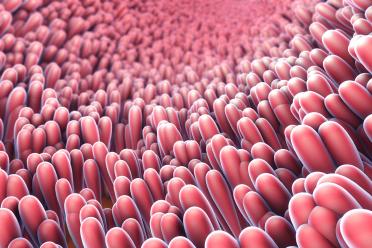Big data analysis drives targeted IBD treatment forward
With World IBD Day recognised on 19 May, we’re looking at how one lab’s research is tackling this increasingly prevalent condition.
Inflammatory bowel disease (IBD) is a chronic disease of the gut with two major types, ulcerative colitis or Crohn's disease.
There are around seven million people living with IBD globally, including 500,000 in the UK, but it’s still unclear why this disease develops or how best to treat it.
IBD is often a complex disease where changes in the genome, the gut microbiome, and the environment trigger the inflammation. It often affects young people and can be a lifelong illness that increases the risk of other diseases, such as bowel cancer.
With World IBD Day recognised on 19 May, we’re looking at how one lab’s research is tackling this increasingly prevalent condition.
To understand IBD, scientists at the Earlham Institute and the Quadram Institute are studying why the disease takes hold and how bioinformatics can help predict the patient's prognosis and diagnosis more effectively.
Data-driven computational approaches analysing high-throughput sequencing data are applied - with hypothesis-based research - to analyse cellular processes in individual IBD patient cases.
"We are developing resources to understand the differences between IBD patients, providing knowledge and biomarkers for selecting the most efficient and effective therapy sooner,” says Dr Tamás Korcsmáros, joint Group Leader at the Earlham Institute and Quadram Institute.

The Korcsmáros Group lab’s multi-omics analysis integrates genomic datasets through systems biology and machine learning to examine the disease’s genomic structure and predict biomarkers for swift diagnosis.
The team also studies patient-specific mutations and changes in the gut microbiota to identify which microbial supplementation is needed for each patient, along with that most useful to hold the disease in remission.
“IBD patients are unique in their genetic makeup, microbiome, and how they respond to treatment,” said Dr Korcsmáros. “We develop tools and research projects to understand how these contribute to the onset of IBD and prevent relapse.”
The Group was part of a recent review exploring the disruption of microbial communities involved in many chronic diseases, including IBD. They helped describe the array of advanced computational tools available that can fill in some of the large knowledge gaps that exist in how mechanisms of the microbiota affect patients.
The overview provides examples for computational approaches that investigate cell interactions between specific microbes and individual hosts, detailing the opportunities this presents for clinical research and uncovering mechanisms for therapeutic interventions and patient diagnosis.


Every IBD patient is different. Our patient-specific IBD research investigates the individual combination of the genome, gut microbiome and clinical therapy response.

To delve deeper into the study of cell interactions in IBD, the Group is developing new resources that apply to single‐cell data. These analyses provide mechanistic insights into individual cell types and their changes.
Knowledge of intercellular communication is scarce and not linked to intracellular processes. This molecular understanding is key in biological processes for omics data analysis.
To address this, they have combined over a hundred resources covering interactions and roles of proteins in inter- and intracellular cell signaling and gene regulation.
The open data resource, OmniPath, provides a central access point for multi-omics analysis, along with workflows and tutorials for human, mouse and rat data.
OmniPath has already demonstrated its effectiveness in exploring novel cell-cell interaction in ulcerative colitis as well as in studying SARS-CoV-2 infection.

We are developing resources to understand the differences between IBD patients; providing knowledge and biomarkers for selecting the most efficient and effective therapy sooner.


Looking closer at how IBD causes alterations in the gut microbiota, the Group has utilised organoid-based models to better understand the role of the host-microbiota interactions in IBD - in particular, the intestinal epithelial (protective cell layer) level.
An organoid is a miniaturised and simplified version of an organ, derived from tissue cells that can self-organise and renew into a three-dimensional culture to show realistic micro-anatomy.
New advancements in organoid technology are pivotal in the study of IBD and the discovery of novel microbial therapies.
The Group conducted a comprehensive review of organoid models, benchmarking their suitability and limitations for studying host-microbe interactions in IBD and highlighting their practicality.
These include applications such as organoid biobanks for microbial screening and ‘omics technologies, drawing upon their potential for further insight into the disease’s mechanisms and, eventually, personalised medicine.
“Every IBD patient is different,” explains Dr Korcsmáros. “Our patient-specific IBD research investigates the individual combination of the genome, gut microbiome and clinical therapy response to demonstrate how personalised microbial therapies can improve the disease course.”
Group Leader Dr Tamás Korcsmáros will be Guest Editor for the upcoming special issue: “Multidisciplinary Approaches in IBD Genetics" in the journal Genes. The issue is open for submissions till 5 July 2021.
The Korcsmáros Group works with the IBD Centre in Leuven (Belgium) and the Nick Powell Lab at Imperial College London.